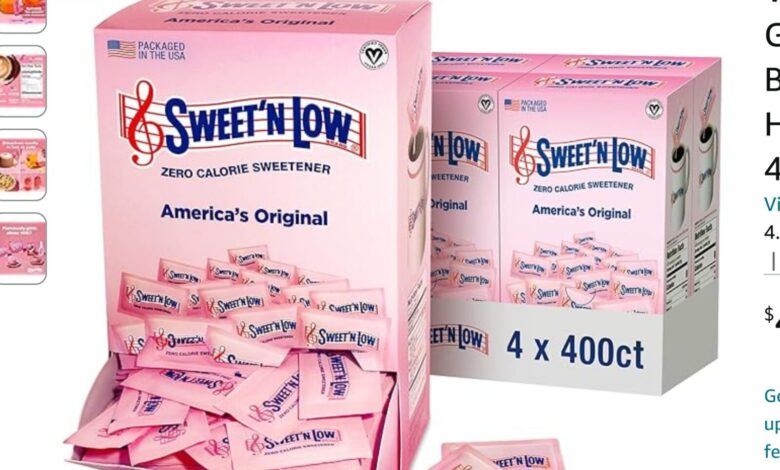”EIGHT PACKETS OF SWEET ‘N LOW?!”

I have a friend who has a rather unusual habit. It’s a natural thing to him, but it definitely gets the attention of everyone around him when it occurs. The usual reaction is one of incredulity, and it’s not uncommon to hear people say, “Eight packets of Sweet’N Low?! You’re kidding, right?”
In a restaurant, this gentleman’s beverage of choice is iced tea. But instead of ordering a full glass of tea he asks for a glass that is only one-fourth full. The remainder of the glass is filled with ice. To that he adds water and “8 packets of Sweet ‘N Low!” He never said why he does that, but to me it’s obvious; he despises the taste of iced tea. All of us at the table chided him for his idiosyncrasy, but he was unwavered in his decision. He drank all of his mega-diluted tea, and then got “a refill” and 8 more Sweet ‘N Lows! The thought that went through my medically oriented mind was “what is all this Sweet ‘N Low doing to his body. I can barely stand the taste of a half packet in tea, but he takes 8; that must affect his liver, or something.
Well, it turns out I was concerned about him unnecessarily because Sweet ‘N Low is harmless. Yes, Sweet ‘N Low is one of the seven (7) most commonly used non-sugar sweeteners (NSS). The active NSS in Sweet ‘N Low is saccharin which is 300 times sweeter than sugar; maybe that’s why it tastes so bitter to me! The other NSS’s are aspartame (Equal, NutraSweet), acesulfame potassium (Sunett, Sweet One), stevia (Stevia, Purevia), sucralose (Splenda), Monk fruit extract (Monk Fruit).
Saccharin has been in use for over 100 years. It was first introduced as a single serving packet in 1957 and has been a popular NSS ever since. Saccharin is not metabolized by the body meaning it is not affected by, nor does it have an affect on, any organ or tissue in the body. It also means it has no caloric content. Thus it has no adverse effects. In particular, there is no connection between cancer and the use of saccharin. This has been proven in more than 30 human studies that have not shown a link.
In the 1970’s, however, male rats were fed very high doses of saccharin and developed bladder tumors. These doses were equivalent to the amount of saccharin in “hundreds of cans of diet soft drink a day for a lifetime!” These doses were higher than the amount any human could consume. Subsequent research has repeatedly proven that saccharin does not cause cancer in humans. The bladder tumors in mice caused by sodium saccharin were later found to be caused by very high doses of sodium salt and not saccharin, and were not relevant to humans. The “mechanism by which rats get bladder cancer is not present in humans.” That was good news for the manufacturers of saccharin. In 1997, saccharin was removed from the National Institute of Health’s list of carcinogens published by the National Toxicology program.
Saccharin has been studied exhaustively and no link to cancer has ever been found. The majority of toxicologists agree saccharin at low doses poses no health risk for humans. That is good, especially if you put 8 packets in your one-quarter glass of tea. From what I’ve read, then, I shouldn’t worry about my friend. I do wonder, however, if his tastebuds are failing to detect a sweet taste so he has to use 8 packets to achieve normalcy. I won’t chide him any longer about his peculiar habit!
I’m sure the next time we have a restaurant meal together he’ll pull out his unique iced tea order, and we’ll all wonder where he came up with that idea.
References: https://www.cancer.gov/causes-prevention/risk/diet/artificial-sweeteners-fact-sheet
http://professional.sweetnlow.com/snl101.php
http://professional.sweetnlow.com/factsaboutlowcaloriesweeteners.php
Pavanello S, Moretto A, La Vecchia C, Alicandro G. Non-Sugar Sweeteners and cancer: Toxicological and epidemiological evidence. Regulatory Toxicology and Pharmacology 2023 Mar 3;139:1-16.





This was a very interesting article considering I to use a lot of Stevia in my unsweetened drinks, and that is just because I preferred the sweet taste of tea as opposed to regular black tea. The same as true for my coffee. If sweet and low is harmless, are the Non-sugar sweeteners just as harmless? As I mentioned, my sugar substitute of choice is Stevia and or monk fruit. I don’t want to assume that they are harmless so I figured I would just ask you since your article didn’t specifically address the others.
From what I could tell, all of these artificial sweeteners are harmless.